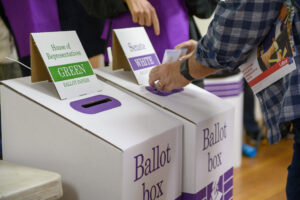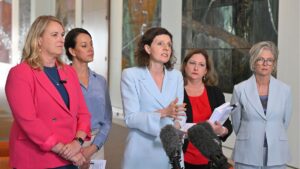Queensland Votes, Tax is Back, David Ipp Speaks
Happy New Year! We hope you enjoyed (or are still enjoying) time off over the summer. 2014, the hottest year on record, sure had its fair share of awful, so here’s to a better 2015. The Australia Institute is heading into the new year stronger than ever, thanks to a big effort in 2014, and thanks to the support of people like you. We wish you the best for 2015, and hope you’ll join our campaigns for a smarter, kinder and fairer approach to policy.
- Accountability and Anti-Corruption Conference in Queensland
- Changing the Budget Focus – To Revenue
- Big Pineapple, Big Election
- Global Go To Think Tank Report Launch
- TAI in the Media
Accountability and Anti-Corruption Conference in Queensland
Accountability, transparency and governance are defining issues in Queensland’s public life and will continue to be vitally important whatever the outcome of the upcoming election.
The Australia Institute is proudly supporting “Accountability and the Law: Safeguarding Against Corruption in Queensland”, a one day agenda setting conference which will be held in the first few days of the new parliament. It brings together many of the state’s leading legal and academic accountability experts, as well as the corruption fighting heavyweight, former commissioner of the New South Wales Independent Commission Against Corruption (ICAC), the Honourable David Ipp AO QC.
The sessions cover many of the most controversial and pertinent issues in recent Queensland public life, with panels including some of the key players in these public debates including 2 former Queensland integrity commissioners, Dr David Solomon and Gary Crooke QC, former CMC Commissioner Philip Nase, recently retired Supreme Court Justice George Fryberg and Queensland’s leading academics on accountability issues, Professor Graeme Orr and Professor AJ Brown, among others.
It is an event not to be missed by anyone concerned about integrity and accountability in Queensland.
WHERE: Customs House, Brisbane
WHEN: 9 February, 2015
Changing the Budget Focus – To Revenue
The ideological cuts proposed and enacted so far by the Abbott Government have been justified by the so called ‘budget emergency’. But Australia’s budget bottom line issues are primarily caused by fluctuations in revenue rather than big increases in spending. Over the past 20 years government spending has averaged around 24 per cent of GDP with a high of 25.3 per cent and a low of 23.1 per cent. So why is all the focus on spending, rather than revenue measures?
When self proclaimed ‘free-marketeers’ do talk about raising extra revenue, again, they are prone to looking in all the wrong places. The coalition of business groups and politicians pushing for the GST to be extended to fresh food have characterised their position as in line with free market economics. ‘Broaden the tax base, lower the tax rate, remove the distortions’ goes their cry.
Until you mention that private schools or private health are exempt from GST that is. These exemptions overwhelming advantage to top 20% of income earners, while the burden of GST on fresh food would, you guessed it, be a of far greater burden to lower income households.
The Australia Institute has worked to change the conversation away from cuts, cuts, cuts, to looking at some of the ways to create both a fairer, and more stable revenue base. Top of our list, however, is not the GST, but instead remains the Superannuation Tax Concession, Diesel Fuel Subsidies and Capital Gains Tax. But if the GST is on the table, our research shows that there are less regressive ways to increase revenue that fresh food.
Big Pineapple, Big Election
The snap election called by Campbell Newman may have reduced the time in which issues of local, national and global significance. Slogans and spin are doing their best to bury major questions about the economy, climate, accountability and governance in the Sunshine State.
The Australia Institute’s released a report last week which revealed that the Queensland taxpayer had subsidised the Abbott Point Coal Terminal to the tune of $2 billion. While the environmental destruction and hazard of coal operations on the Great Barrier Reef are better known, the report ignited debate about the economics of the project, which has never been subject to a public cost-benefit analysis.
TAI will also be putting anti-corruption issues on the agenda before the election, in the lead up to the accountability conference.
Global Go To Think Tank Report Launch
The Australia Institute will join a number of Australia’s top think tanks to launch the 8th Annual Global Go To Think Tank Report in Canberra.
Produced by the Think Tanks and Civil Societies Program at the University of Pennsylvania, the Global Go To Think Tank Report is the most comprehensive ranking of the world’s top think tanks. There will be a press conference and event to recognise the work being done in Australia and around the world, and the leaders of the industry.
Where: Australian Institute of International Affairs, Stephen House, 32, Thesiger Court, Deakin
When: Friday, 23 January 2015 – 10am to 12pm – RSVP: intern3@internationalaffairs.org.au.
TAI in the media
Guardian: Queensland Taxpayers Subsidised Abbot Point Coal Port Expansion By Up To $2bn
Canberra Times: Slap GST on private school fees if you truly have an interest in fairness
Financial Review: Left Pushes GST for Private Schools Health
SBS: Long Work Hours and Alcohol Abuse Linked
The Australian: Health, School Fees Eyed for GST
Canberra Times: Joe Hockey Looking in the Wrong Place for a Budget Fix
Between the Lines Newsletter
The biggest stories and the best analysis from the team at the Australia Institute, delivered to your inbox every fortnight.
You might also like
The rise of early voting in Australian elections
Are voters missing out on more than their democracy sausage?
Who votes with whom? Beware claims that use voting records to argue politicians have similar views
Sky News says community independent MP Allegra Spender supports more Coalition motions than Greens motions. But They Vote for You says Spender votes with Greens MPs more often than Coalition MPs. That both those claims are made about the same person is proof that voting comparisons are fraught. It is just as confusing when it
Election entrée: Speakers from other parties
Every Australian parliament – federal, state and territory – has had a speaker from a party other than the one in government at some point.


